精品课件新目标英语教学课件
1新目标九年级英语上Unit10 Section A 1a — 2d 教学课件 (共36张PPT)
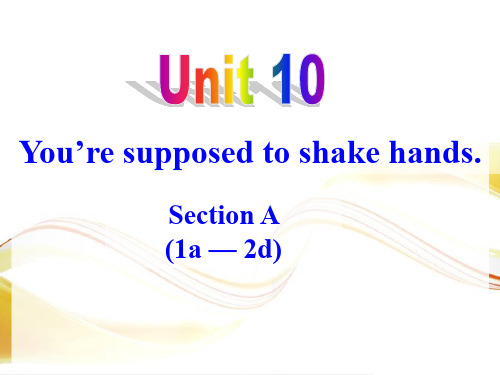
Section A (1a — 2d)
Look at the map of the world. Please list the countries as many as possible and tell the others what people do when they meet for the first time in different countries. Work in pairs and discuss the question.
In China Shake hands
we are supposed to shake hands when we meet for the first time.
In Japan what do people usually do when they meet for the first time?
2d Finish the conversation with the correct words.
Katie: How was _t_h_e__w_e_l_c_o_m__e__p_a_r_ty____ for foreign students last night?
John: Great! I _m_a__d_e__ some new friends. But a _fu_n__n_y___ thing happened.
4.Maria should ask what she is supposed to _w_e_a_r_ if she is invited to a party next time.
2c Role-play a conversation between Maria
新目标(人教)七年级下册英语教学课件 Unit 10 Section A(GF-3d)

Unit 10 I'd like some noodles.
Section A (Grammar Focus-3d)
➢ Key words & phrases:
学习目标
meat; what size; what kind of; countable; uncountable.
In our group, Sally and Tom would like some hamburgers. Anna and Jim would like tomato and egg rice. Nobody would like potato salad. ...
Exercises
一、将方框中的单词按照可数名词和不可数名词进行分类并写 出可数名词的复数形式。
What kind of noodles would you like? I’d like beef noodles, please.
What size would you like?
I’d like a large bowl, please.
Would you like a large bowl?
➢To learn to distinguish and use countable and uncountable
nouns about food.
What kind of noodles would you like?
What size would you like?
➢ How to make a dialogue between the waiter and the customer(顾客) ?
2._W__h_a_t_s_iz_e__w_o_u_l_d_y_o_u__l_ik_e_?___________________ (size) _I_’d__li_k_e_a__m__ed__iu_m__b__o_w_l_, _p_le_a_s_e_. ______________ (medium)
新目标(人教) 八年级下册英语教学课件 Unit2 Section A(3a-3c)

Section A (3a-3c)
学习目标
➢ Key words & phrases: several; strong; feeling; satisfaction; joy; owner; try out; journey;
2. What are they doing?
They are reading books.
➢ Task 1 skimming and matching
Para.1
总述
Mary’s voluntary work and her feeling.
Para.2
分述
The general introduction of Mario and Mary.
( A) 3. What do Mario and Mary have in common? A. They both have a kind heart. B. They are both rich.
C. They both like animals.
D. They both like reading.
Look at the picutre and answer the questions.
1. Where is the boy? He may be at an animal hospital.
2. What job do you think the man next to the boy in the picture does? Maybe he is an animal doctor.
animals get better and the look of joy on their owner’s faces.”
新目标七年级英语课件
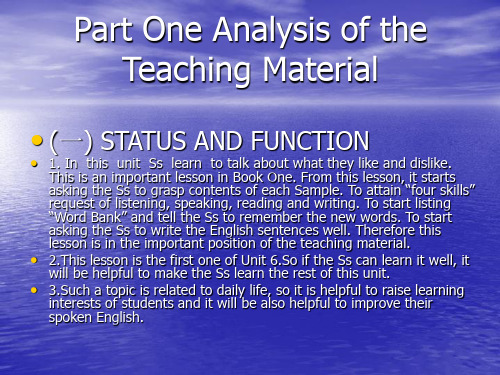
by showing some pictices to the Ss.
• (3) To finish some exercises. • 2.Ability objects • (1) To develop the Ss’ abilities of listening, speaking,
2. Making up dialogues
between
you and your
parents about
likes and dislikes
Blackbaord planning:
Unit 6 Do you like bananas?
Do you like……?
Yes , I do.
I like ……
3 A: Do you like oranges? B: Yes, I do.
Do you like……? Yes, I do. No, I don`t.
Homework
Oral work:
Recite the new words
Written work:
1. Copy the new words
chant
I like bananas. I like bananas. Yellow, yellow, bananas.
I like tomatoes. I like tomatoes . Red, red, tom atoes.
I like ice cream . I like ice cream . W hite, w hite, ice cream .
ice cream
人教版新目标七年级英语上册 说教材PPT课件

采用活动途径 倡导体验参与
注重过程评价 促进学生发展 整体设计目标 体现灵活开放 开发课程资源 拓展学用渠道 面向全体学生 注重素质培养
编 者 的 意 图
说 听
Grammar focus 小对话 的听辨
读 写
小组对话 Game
Game
Section B 知识扩展与综合运用
词汇检测
Section A 体 结对活动 基本的语言内容
学习策略
文化意识
具 体 目 标
文化知识 文化理解 跨文化交际 意识能力
说
能用简短的英语进行交际,以及简单交流。 能在教师的指导下参与游戏和角色扮演。 能利用所给提示简单描述一件事情。 能提供有关个人情况和个人经历的信息。 能讲述简单的小故事,能唱一些英语歌曲。 能做到语调基本正确。
能正确地朗读课文 能理解简短的书面指令,并根据要 求进行学习活动 能读懂简单故事和短文并抓住大意 能初步使用简单的工具书 除教材外,课外阅读量应累计达到 4万词以上 。
班级图书角 班级小报 墙报等
鼓励学生交流 学习资源
学生具备综合运用语言知 识的技能, 能够高效获取 信息、处理信息, 具有分 析和解决问题的能力
是学生自主、合作、 探究学习的乐园
学生对英语的学习成 为一种需要和迫切 任务
理想的英语课堂
学生收获 教师收获
在快乐中学 习 并能学以致
教学 结果 预测
从繁重的批改辅 导中解放出来, 同时收到更好的 教学效果
乐于参 与语言 实践
有浓厚 的学习 兴趣
有明确 的学习 目的
积极合 作互帮 互助
点此播放讲课视频
情 感 态 度
点此播放动画视频
主动练 习实践 所学内 容
新目标英语九年级Unit1全单元课件

How do you study for a test ?
I study English by watching videos.
I study English by taking notes.
How does he study for a test ?
4 skills:
1. Reading skills 2. Writing skills 3. Speaking skills 4. Listening skills
Unit 1
How do you study for a test?
Period1(SectionA1a-2c)
Go for it
How do you come to school?
by bike
by car
by subway
on foot by plane
by train
by bus
by ship
pair work
Surf the Internet
Work with the groups
Ask the teacher for help
How does he/she learn English?
He/She learns English by doing…
Memorize words
Listen to the tapes
Join the English club
HThoewredisoaesbigJiEmngslitsuhdteysftoorn aTnueEsdnagyli.sh test ?
Watch English-language read the
videos
textbook
新目标(人教)七年级下册英语教学课件 Unit 9 Section B (2a-2c)
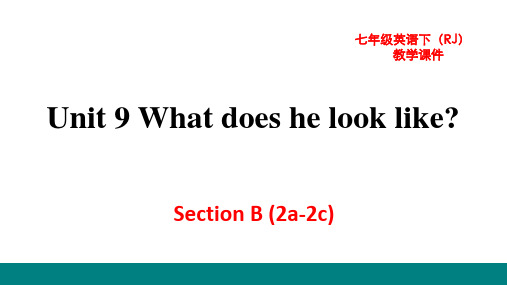
2b Read the article. Which picture shows the real criminal?
2c Read the article again and write what the words in bold refer to.
1.He=___J_o_e__B_r_o_w_n_____________________________ 2.it=____th_e__p_ic_t_u_re__o_f _th_e__c_ri_m_i_n_a_l_________________
七年级英语下(RJ) 教学课件
Unit 9 What does he look like?
Section B (2a-2c)
➢Key words & phrases:
学习目标
artist; crime; criminal; put; each; way; describe; differently; another;
6.He=___th_e__c_ri_m_i_n_a_l____________________________
Language points
1. He wants to draw a good picture of each criminal. 他想画好每 个罪犯的画像。 each adj. & pron. 每个;各自
“The criminal is of medium height and young. He has long
straight brown hair and big eyes,” says one woman. Another
woman says, “He is tall and thin, and he has curly blonde hair.
初中-英语-人教新目标-九年级全册ppt课件
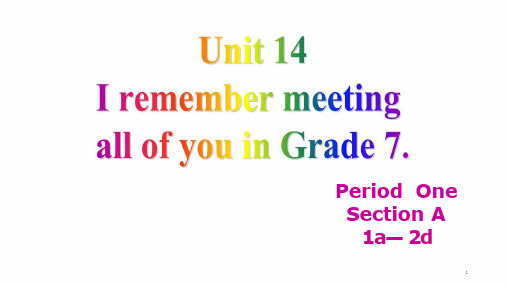
•We can share our past memories and
experiences at junior high school by using I remember doing…,I have done… and other tenses and clauses.
Judy
Ms. Griffin
glish
En encouraged her a lot
Because of her, she put in more effort and
her exam scores doubled.
They will go shopping tomorrow to get each teacher a card and gift to say thank you .
knee . He told Brian to take a brea____k__from running .
His best memory is when That’s Life pl__a_y_e_d__at school . They
wrote a _lett___e_r__ to the band and they _o_f e_d__to come .
_ _ _ _ _ _ Someone had a health problem. _ _ _ _ _ _ Someone joined the school band.
√ Someone liked Mr. Hunt' s teaching methods.
10
2b. Listen again. Match each question with the name of the person.
新目标英语九年级第十单元课件
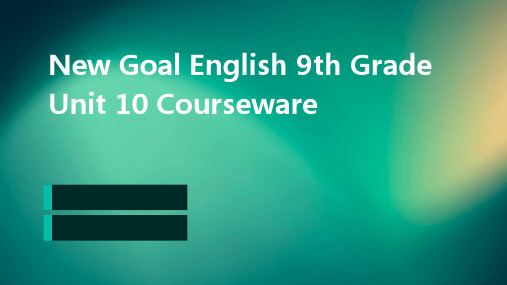
Inspire students to develop a positive attitude towards innovation and technology, and cultivate their academic spirit
Course ware design concept
Student centered
The courseware is designed to meet the needs and interests of students, with a focus on practical language use and skill development
Flexible and adaptable
Explore word roots and affixes
Help students understand word formation by looking at roots, prefixes, and suffixes
Encourage independent learning
Direct students to online resources or dictionaries where they can look up new words independently
Process and method
Enhance students to actively participate in class discussions, group work, and presentations to improve their communication and collaboration skills
新目标英语说课t PPT课件
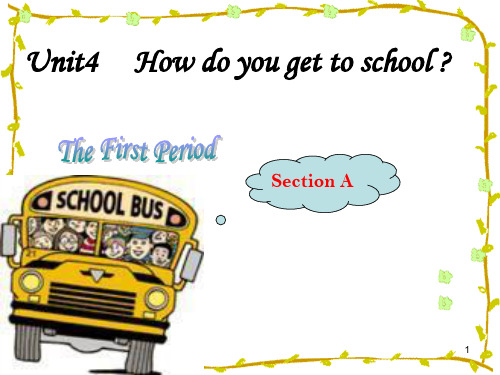
b. study the phrase: take +the + bus/car/train… by+ bus/car/train ride a bi Nhomakorabeaycle
2. Difficult points make the students talk about how to get to
After watching it, T: What kinds of transportations can you see in
the video? S: train, car, boat… T: Yes, you did a good job. And today, we will
learn unit 4 how do you get to school? 9
Unit4 How do you get to school ?
Section A
1
Teaching Plan
• Part one Analysis of the teaching material • Part two Teaching and learning methods • Part three Teaching aids • Part four Teaching procedures
4
Teaching objectives
• 1. Knowledge objectives: learn the key vocabularies of
transportations and the structure of ‘how…’ • 2. Ability objectives :
新目标(人教)七年级下册英语教学课件 Unit1 Section A(GF-3c)
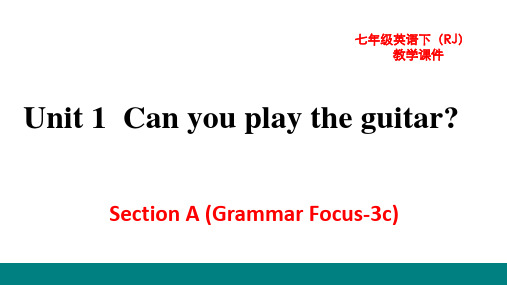
What can you do?
I can dance./I can’t sing.
What club do you want to join? We want to join the chess club.
助动词
实义动词
观察左栏句子,最后一句和前面 的句子有什么不同?
What club do you want to join? 这句话为含有实义动词want的一般现在时的句式结构。
can表“能力”用法 can表示能力时,意为“能;会”。“can+动词原形”表示
“(某人)能/会做某事”,其否定形式为“can’t/cannot+动
词原形”,表示“(某人)不能/不会做某事”。
➢I can play basketball, and my brother can play football. 我会打篮球,我哥哥会踢足球。
否定句
一般疑 问句
He can play the piano. 他会弹钢琴。
主语 + can’t/cannot + 动词原形+其他.
He can’t/cannot play the piano. 他不会弹钢琴。
Can + 主语 + 动词原形 + 其他? 肯定回答:Yes, 主语 + can. 否定回答:No, 主语 + can’t.
Read the poster.
学校(文艺)表演招募学生 show n. 演出;节目 v. 给……看;展示
play sing tell dance
Students Wanted for School Show
We want students for the school show. Can you
新目标九年级英语unit全单元课件

02
Multimedia Resources
Utilize a variety of multimedia resources such as videos,
podcasts, and interactive websites to engage students and
provide diverse perspectives.
Overview of Unit Structure and Content
3. Exploring Culture through Media
4. Developing Cultural Competency Skills
5. Reflecting on Learning and Growth
Overview of Unit Structure and Content
Knowledge Expansion
01
Unit Overview
Unit Theme and Objectives
• Theme: The unit's theme revolves around exploring different cultures, understanding diverse perspectives, and developing cultural competency skills.
Grammar in Context
Grammar rules and concepts will be taught within the context of authentic texts to help students understand how grammar is used in real-life communication.
新目标(人教) 八年级下册英语教学课件 Unit2 Section B(2a-2e)

What would it be like to be blind or deaf? Or imagine you can’t walk or use your hands easily. Most people would never think avb. 想ou象t this, but many
How many kinds of letters do you know?
recommendation letter 推荐信
position-asking letter 求职信
thanks letter
Today we will read a thank-you letter from Ben Smith to Miss Li.
understands many English words. He can understand me when I give
order n. 指令;命令
立刻;马上
him orders. For example, I say, "Lucky! Get my book," and he does it at
Para.1引入主题
Dear Miss Li,
把某物给某人 give sth. to sb. =give sb.
主题句
sth. 当 sth.是代词时,只能用前者。
I’d like to thank you for giving money to Animal Helpers. I'm
因……而感谢你(们);for后面跟动词-ing作宾语。
make it + adj. + to do sth. 使做...变得...
新目标七年级英语Unit全单元完整课件

Section B部分
进一步掌握单词和短语
听说技能强化训练
通过多种教学活动和练习,让学生进一步熟 悉和掌握单词和短语,提高他们的语言运用 能力。
通过听录音、角色扮演、讨论等方式,让学 生进一步巩固和提高听说技能,培养他们的 英语口语表达能力。
英语词汇书籍
推荐一些适合七年级学生的英语词汇书籍 ,如《7th Grade Vocabulary Workbook 》、《1001 Vocabulary Words You Need to Know》等,这些书籍可以帮助 学生扩大词汇量并提高阅读理解能力。
THANK YOU.
英语原版阅读材料
英语原版阅读材料可以帮助学生提高阅读理解能力和扩大词汇量。可以选择适合七年级学生水平的英语原版书 籍,如《Harry Potter》系列、《Diary of a Wimpy Kid》系列等。
网络资源推荐
Coursera
Coursera是一家全球性的在线教育平台,提供来自世界各地的高质量课程。其中 ,有许多针对七年级学生的英语课程,如“English for 7th Grade Students” 等课程。
本单元以话题为线索,通过图片、对话、短文等形式呈现, 注重情境创设和任务驱动,培养学生的综合语言运用能力。
学情分析
学生年龄特点
七年级学生年龄在12-13岁之 间,处于儿童期和青少年期的 过渡阶段,具有好奇、好动、
好表现等特点。
学生英语水平
学生已经掌握了一定的英语基础 ,具备基本的听说读写能力,但 还需要进一步加强。
02
单元教学内容
Section A部分
人教新目标2023年秋季九年级英语开学第一课课件 (共31张PPT)

人教新目标2023年秋季九年级英语开学第一课课件(共31张PPT)(共31张PPT)BETTER ENGLISH九年级英语-【开学第一课】2023年初中秋季开学指南之爱上英语课ContentPART One What is the bestPART Two What we will meetPART Three How we doPART Four Tips from your teacherPart OneWhat is the bestIf1 2 3 4 5 6 7 8 9 10 11 12 13 14 15 16 17 18 19 20 21 22 23 24 25 26is equal toABCDEFGHIJKLMNOPQRSTUVWXYZLuckL+U+C+K : 12 + 21 + 3+ 11 = 47%LoveL+O+V+E : 12 + 15 + 22 + 5 = 54%KnowledgeK+N+O+W+L+E+D+G+E:11+14+15+23+12+5+4+7+5 = 96%Hard WorkH+A+R+D+W+O+R+K:8+1+18+4+23+15+18+11 = 98%What is the bestMoneyM+O+N+E+Y:13+15+14+5+25 = 72%LeadershipL+E+A+D+E+R+S+H+I+P:12+5+1+4+5+18+19+9+16 = 89%ATTITUDEA+T+T+I+T+U+D+E:1+20+20+9+20+21+4+5 = 100%What is the bestIt is OUR ATTITUDE towards life and work that makes OUR Life 100% ! ! ! Attitued is the bestPart TwoWhat we will meet.The Contents of Grade Nine1.Fourteen Units2.Eight topics3.More than 700words and phrases4.Four main grammars5.Twenty-eight listening exercisings6.About twenty writing exercisings7.Twenty weekly exams8. One-last most important exam Love from parents:Unit 7PLANNINGBIOLOGYPROJECTRESEARCHHEALTHCARESUCCESSLEARN45637281Accidents:Unit 8, Unit 12 Preferences:Unit 9Manners:Unit 10The ways of learning: Unit 1Festivals and Culture: Unit 2, Unit 5, Unit 9 Changes:Unit 4Invention:Unit 5, Unit 6 Language Knowledge Environmental Protection Unit 13 Environmental Protection Unit 13Growing-up storyUnit 11MemoryUnit 14Language KnowledgeRevisionVerbs(动词)Verbs(动词)Verbs(动词)Modal Verbs(1)must(2)can和can’tRevision of Infinitives(1)to+动词原形,有时可以不带“to”(2)具有名词、形容词和副词特点,作主语、宾语、宾语补足语、定语和状语(3)否定形式Passive Voice(被动语态)and its uses(1)含有情态动词的被动语态(2)被动语态的几种基本时态(3)被动语态的用法Past Perfect Tense(过去完成时)(1)构成(2)用法Grammar Knowledgehow, whyhow指代程度why指代原因if, whether在口语中常用if引导的是一般疑问句形式that,who ,whichthat在口语或非正式文体中常省略who指代主语的人which指代某事where, whenwhere指代“在某地”when指代的是“在某时”Objective Clauses (宾语从句)1)定义:基本知识,主句+先行词+从句指物或指人的关系代词that 在从句中作主语或宾语I love movies that are funny.That’s the man that you are looking for.指物:which在从句中作主语或宾语The book which is on the table is mine.指人:who, whom在从句中分别作主语和宾语I love singers who write their own music.The person to whom you just spoke is Mr. Li.带修饰句的复合句Attributive Clause(定语从句)Word Formation(构词法)复合数词fifty-four(数词+数词)复合代词everything,somebody anything(不定代词+名词)复合副词downstairs(副词+名词)复合名词classroom(名词+名词) blackboard(形容词+名词)复合形容词worldwide(名词+形容词)good-looking(形容词+分词)复合动词overcome(副词+动词)1.合成法(Compounding)派生法(Derivation)前缀(远))telephone,televisiontele-(又、再、重新)review, return, rewritere-(相互、交互、在一起)interview, international, Internetinter-(不、非,表示否定)unfriendly, unpleasant,uncomfortableun-(不、非,表示否定)disadvantage, dishonest, disagreedis-(两个、双边的)bicyclebi-派生法(Derivation)后缀后缀后缀后缀后缀-or /-er (从事某种职业的人,名词后缀)actor, visitor, director, singer, runner worker,driver-ist(人,名词后缀)artist, scientist, tourist, terrorist-ese(民族、语言,名词后缀)Chinese,Japanese-tion(表示动作、状态,名词后缀)invitation, attraction, population, pronunciation-ful(充满,形容词后缀)successful, beautiful, colorful, wonderful-y(表性质,形容词后缀)funny healthy, cloudy windy-ing(形容词后缀)boring, exciting, interesting, outstanding-ed(形容词后缀)surprised, balanced, relaxed, talented-al(.....·的,形容词后缀)traditional, international, natural--able(能够,形容词后缀)comfortable, unforgettable-less(没有、无,形容词后缀)(副词或形容词后缀) homeless, helpless, careless-ly(副词或形容词后缀)really, usually, finally, friendly转化法( Conversion )名词转化为动词show n.展览;展示---show v.表演;展出water n.水---water v. 浇水形容词转化为动词slow adj.慢的---slow v.放慢动词转化为名词walk v.散步;走---take a walk n.look v.散步---have a look n.看一下,看一看缩写(Abbreviation )“截头”airplane → plane telephone → phone“去尾”laboratory → lab advertisement → ad examination → exam “既截头又去尾”mathematics → math influenza → flu截断法(compact disk)CD(National Basketball Association)NBA(China Central Television)CCTV(unidentified flying object)UFO(United Nations)UN(United States of America)USA(World Wide Fund for Nature or World Wildlife Fund) WWF简写(Simplification)Part ThreeMore words2000-3000in alllonger to readhigher to writedifficult tolisten and speakHow we do.How we docourage to facelike to solveset a reasonable goalHow we do.in classbeforeinafterprepare for new words and texts take the notestalk with your teachers discuss with classmatesfinish homeworkslove the problemsdo more exercisesHow we do.exambeforeinaftergood revisiondo it seriouslydevide your timecheck patientlypay more attention to mistakesadjust your waysHow we do.Part FourMemorizing immediately is the best way to learn English wellTips from your teacher.Memorizing immediately is the best way to learn English wellTips from your teacher.They are used to copy, rewrite, finish the writing tasks and so on.It is used to write down the importance and difficulties from the classes, your teacher,and others when reading.We can put down the mistakes on it ,which we meet and exam so that we can look them up easily if necassary. Ank also, we can write down the key target languages of each unit.It is very easy for us to find out the words which we don’t understand the meaning of new words when we reading and exercising.a set of exercise booksa thick notebooka special notebooka dictionaryTips from your teacher.The other things you have to own for your usual learningif you are brave orcareful enough.Tips from your teacher.Two senteces are believable for your English learning wellBelieve inyourself and youcan do it .THANK YOU!九年级英语-【开学第一课】2023年初中秋季开学指南之爱上英语课。
新目标英语九年级Unit全单元课件

05
Review and Summary
Review of Key Grammar and Sentence Patterns
1 2 3
动词时态的复习 对于英语中的不同动词时态,包括现在时、过去 时、将来时等,进行深入复习,通过大量例句理 解并掌握其用法。
句型结构的复习 复习英语中的基本句型结构,包括主谓结构、主 谓宾结构、主系表结构等,通过实例解析,加深 对句型结构的理解。
Cultural Sensitivity
Emphasize the significance of cultural sensitivity when interacting with locals during travel. Teach students to show respect for local customs, traditions, and beliefs to ensure a positive cultural exchange.
Social etiquette and language standards
社交礼仪
01
讲解和示范社交场合的基本礼仪,如打招呼、道别、感谢、道
歉等,帮助学生建立良好的社交习惯。
语言规范
02
学习和了解英语的语言规范,如正确使用语法、词汇,避免俚
语和粗话,提高学生的语言素养。
跨文化交流
03
介绍不同文化背景下的社交礼仪和语言规范,增进学生对多元
Historical events and character introductions
培养历史素养,拓宽文化视野
• 学习历史事件和人物介绍,有助于培养学生的历史素养和 文化意识。通过了解不同历史时期的文化、政治、经济等 方面的变革,学生将能够更好地理解当今社会的根源和发 展脉络,拓宽文化视野,增强跨文化交流的能力。
新目标(人教) 八年级下册英语教学课件 Unit1 Section A(GF-4c)

4b Circle the best advice for these health problems. Then add your advice.
1. Jenny cut herself. She should (get an X-ray / put some medicine on the cut). My advice:
I hurt my back when I fell off my bike.
⑤ sb. get/got hit on the +身体部位. e.g. He got hit on his head when he passed by the
playground.
3. ache, sore和hurt 的区别: (1)ache 是一个名词后缀,表示某部位疼痛。
some sleep/rest; have colds; fall down. ➢ Key sentences:
1. Did you hurt yourself playing soccer? 2. You should go home and get some rest. 3. Should we go to school? ➢To learn the usage of should and reflexive pronoun.
1) Did you buy anything for yourself? 你为你自己买什么东西了吗?(做介词宾语)
2) The old man taught himself English. 那位老人自学英语。(做动词宾语)
3) The thing itself is not important. 事情本身并不重要。(做同位语)
see a doctor in time
新目标英语第一单元SectionA课件

Share best practices and improve teaching effectiveness through collective learning.
THANKS
感谢观看
01
Student engagement
Did students actively participate in class activities? Did they
show interest and enthusiasm?
02
Learning outcomes
Did students achieve the learning objectives set out in the
Improvement measures
Refine lesson plans
Identify areas where improvements can be made to ensure better learning outcomes.
Incorporate more active learning methods
lesson plan?
03
Feedback and assessment
Was feedback provided to students on their performance and
progress? Did the assessment methods align with the learning
04
详细描述
除了基础词汇,本部分还注重拓展学 生的词汇量,教授一些较为高级的词 汇,帮助学生提高英语表达的丰富性。
06
- 1、下载文档前请自行甄别文档内容的完整性,平台不提供额外的编辑、内容补充、找答案等附加服务。
- 2、"仅部分预览"的文档,不可在线预览部分如存在完整性等问题,可反馈申请退款(可完整预览的文档不适用该条件!)。
- 3、如文档侵犯您的权益,请联系客服反馈,我们会尽快为您处理(人工客服工作时间:9:00-18:30)。
take the ship
I go to school by ship. I take the ship to school.
plane
take the plane
I go to school by plane.
I take the plane to school.
walk
walk
I go to school on foot.
5. He gets to school _b_y__b_ik_e_. 6. They get to Beijing b_y__p_la_n_e_.
They _ta_k_e_t_h_e_t_ra_i_n to Xi’an.
3. They get to school _b_y_c_a_r. They _ta_k_e__a_c_a_r to school.
4. They get to school _b_y_b_o_a_t _.
They _t_a_ke__a_b_o_at to school.
ride a bicycle I ride a bicycle to school.
take a taxi
taxi
I go to school by taxi.
I take a taxi to school.
car
I go to school by car.
take/drive the car I take the car to school.
take the car take the plane take the ship take the bus take the taxi
ride a bike walk
How do they get to school ?/ How does he/she get to school ?
by bike
They get to school
My friends _w_a_l_k to school.
by bike on foot
按照图画内容完成下列句子。
1. They get to school _o_n_f_oo_t_. 2. They get to Xi’an _b_y_tr_a_in__.
They _w_a_lk_ to school.
He takes the subway to school. =He gets to school by subway.
How do they get to school?
需要注意 的是,表 示“走路” 时不用by foot而用on
foot.
They walk to school.
=They get to school on foot.
by bus
by car
by subway
Key points
I take the car to school.
I get to school by car
My father takes the _b_u_s_ to school.
He gets to school
He takes the s_u_b_w__a_y to school.
2
3
4
5
How do you get to school ?
I walk/take a bus/ride a
bike/…to school.
Find a partner and practice the conversation.
How do you get to school?
take the train take the subway
How does she get to school?
She takes the train to school. =She gets to school by train.
How do they get to school?
They take a taxi to school. =They get to school by taxi.
人教版九年义务教育新目标英语八年级上册
Unit 4
How do you get to school? Section A 1a-1c
bus
I go to school by bus.
take a/the bus I take the bus to school.
bicycle bike
I go to school by bike/bicycle.
How do you get to school?
I take the bus to school. =I get to school by bus.
ride a bike
take the bus take the train
take the car walk
take the boat take the taxi
I go to school by train.
train
take the train I take the train to school.
subway
I go to school by
take the subway I taskuebtwhaeys.ubway to school.
ship
by bus by subway
Mary takes the _tr_a_i_n_ to school.
She gets to school
She takes a _t_a_xi_ to school.
by train by taxi
They ride the _b_ik_e_ to school.
How do you get to school?
I ride my bike to Nhomakorabeachool. =I get to school by bike.
需要注意的是,表示“骑自行车”时不用take the bike而用ride the/a/one’s bike
How does he get to school?
I walk to school.
Listen to the sound of the transportations and guess what kind of transportation it is.
How do you get to school?
I take the car to school. =I get to school by car .
